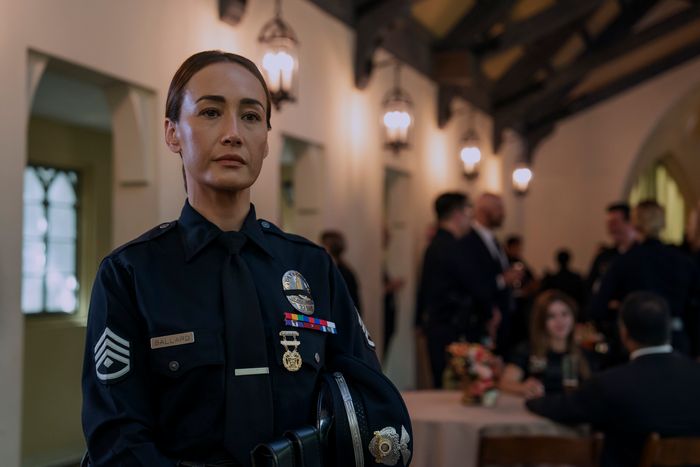
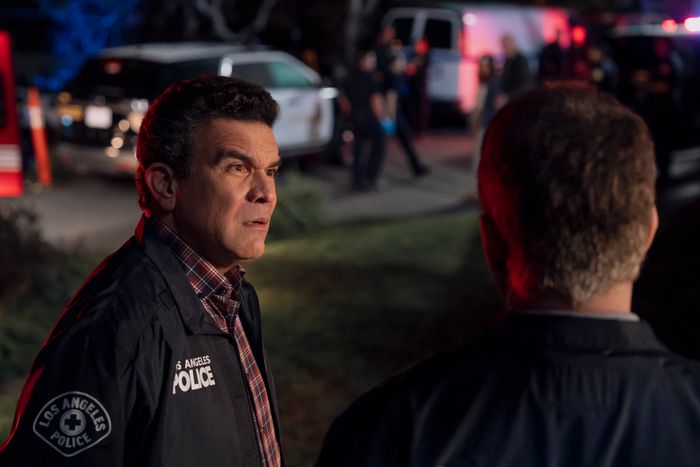
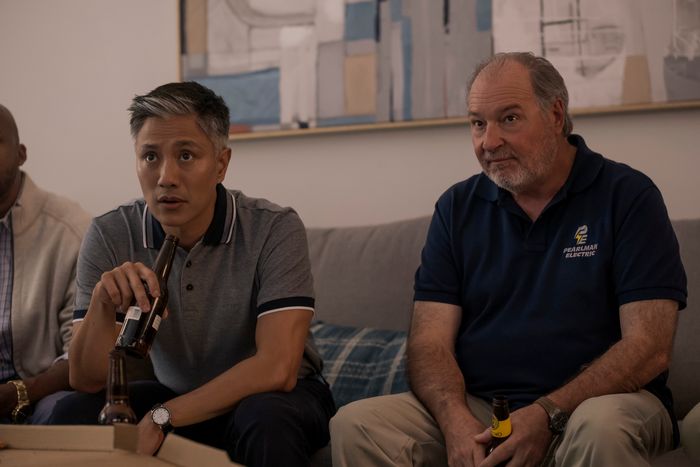
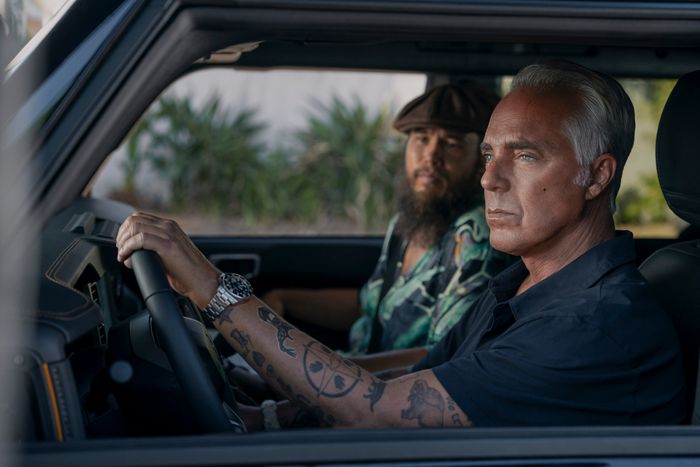
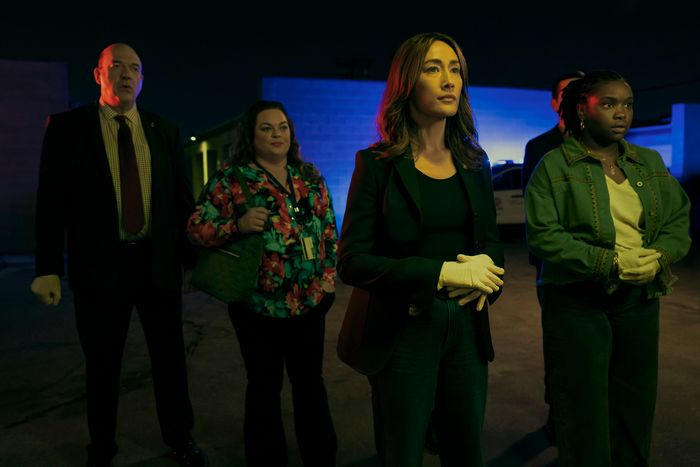


The speed with which Ballard is chewing through Michael Connelly’s Ballard and Bosch novels opens up countless avenues for the series to explore in a second season. Photo: Elizabeth Morris/Prime
Spoilers follow for the first season of Ballard, all ten episodes of which premiered on July 9 on Prime Video.
It’s a day ending in y, so time for another show about cops! This one is Ballard, a spinoff of Bosch: Legacy, which was itself a spinoff of Bosch, the Prime Video series based on crime writer Michael Connelly’s dozens of novels about the titular LAPD detectives Renée Ballard and Harry Bosch. Ballard stars Maggie Q as the dogged and empathetic investigator, whose history of personal loss and professional betrayal has shaped her interest in gaining justice for long-forgotten victims. There are 6,000 LAPD cold cases, Ballard tells us, and as the head of the new Cold Case Unit, Renée is committed to closing as many as she can. Her first case is the early 2000s murder of teenager Sarah Pearlman, whose death inspired her brother, Councilman Jake Pearlman (Noah Bean), to fund the Cold Case Unit and support Ballard as its head — as long as she finds who killed Sarah and does it in a way that makes him look good politically.
Ballard pulls elements primarily from three of Connelly’s books (2017’s The Late Show, 2018’s Dark Sacred Night, and 2022’s Desert Star) but also makes up a fair amount of original material to stretch over the first season’s ten episodes. There are new characters and new cases, including episodic one-offs to balance the source material’s more serialized approach. There is also — I’m sorry to the Bosch-heads — very little of Titus Welliver. Instead, Ballard is all about establishing its title character as a badass workaholic who refuses to bend to the department’s sexism and has faith in her teammates on the Cold Case Unit to give all their effort to their cause. “Cops can be assholes. Doesn’t make it personal,” Ballard’s former partner tells her early on in the season. But when the season ends with Ballard framed for a murder she didn’t commit, things get very personal — and very different from the books on which Ballard is based. So let’s break down that ending and the rest of the series’ most meaningful changes to the source material.
Ballard somehow manages to make Robert Olivas (Ricardo Chavira) suck even more than he does in the books. Photo: Tyler Golden/Prime
Let’s start at the end. For the most part, Ballard sticks to the professional history established for Renée in Connelly’s books: She was a slightly reckless, but respected, Robbery-Homicide Division (RHD) detective who got abandoned by her colleagues after she filed a complaint against her supervisor, Robert Olivas. Although Renée’s partner at the time, Ken Chastain, witnessed Olivas’s attempt to sexually assault her, neither Chastain nor anyone else came to her defense, Internal Affairs sided with Olivas, and Ballard got bumped from RHD to working the midnight shift. In Connelly’s The Late Show, Chastain is executed for poking around a case, and Ballard enlists Olivas to help her find the other cop who did it. In Dark Sacred Night, Ballard shares that Olivas, who has a documented pattern of sexual abuse, has been put in charge of a special task force investigating sex crimes; Connelly loves portraying the LAPD as incompetent and self-defeating. Ballard and Olivas still hate each other in 2019’s The Night Fire, the last book in which he appears, but Ballard proves her worth enough that by Desert Star, she’s leading the Cold Case Unit, and Olivas is a distant, bitter memory.
Ballard changes all this up by mashing up various pieces of The Late Show, The Dark Hours, and Desert Star and by changing Olivas (Ricardo Chavira) to a serial sexual predator who also happens to be a major player in a ring of dirty cops running guns and drugs for a Mexican cartel. He sucks! Olivas’s arrest is a satisfying moment for Ballard and Samira Parker (Courtney Taylor), a former partner of Olivas’s who left the LAPD after he raped her and who joins Ballard in the Cold Case Unit. Maggie Q and Taylor portray a great, emotional moment together when they celebrate Olivas’s capture. But then! Olivas makes a deal with the district attorney to avoid prosecution, which infuriates Ballard and leads to her confronting him at his house, shoving him around, and … leaving her DNA on the scene, which sure makes it seem like she might have killed him when he ends up dead. The season ends with Ballard’s arrest for murdering Olivas, which we assume Ballard didn’t actually do and also gives the series an entirely new story line for the second season.
In the books, Ballard has killed a number of dudes. In The Dark Hours, she kills a dirty cop named Bonner who breaks into her house and tries to choke her to death; that story line gets adapted for the show with the cop Anthony Driscoll, a.k.a. Montana (Brendan Sexton III), whom Renée identifies as being in the same cartel-affiliated cop ring as Olivas. Whenever Ballard kills someone in the books, she lawyers up with a union representative and ends up successfully defending herself, because pretty much every case is justified. The Olivas story line for the series is an interesting change from that pattern: How does Ballard prove something she didn’t do? I’m assuming the rest of the Cold Case Unit will get involved, especially Parker, who personally experienced Olivas’s villainy. And the series does introduce new character Manny Santos (Colin McCalla), another cop who worked with Olivas and Driscoll and whose change of heart afterward might help Ballard’s defense. Ultimately, though, it’s sort of funny that Ballard ends by putting its protagonist in such a Bosch-adjacent situation (in the books, he’s accused more than once of vigilante violence) when the series otherwise diminishes his influence in this story. (More on that later.)
While the killer’s motivation may be a little on the nose, the Ballard version has more emotional impact than in the books. Photo: Patrick Wymore/Prime
In Desert Star, Sarah Pearlman’s murder is worked primarily by Ballard and Bosch, and they find a connection between Sarah’s death and that of a young Black woman named Laura Wilson, who was found with a campaign pin for Councilman Pearlman in her possession. Bosch has the idea to pull a palm print left behind on Sarah’s window for DNA, and he and Ballard eventually learn that Ted “Lou” Rawls — the former Santa Monica cop who was Jake’s close friend from high school, and was on Ballard’s Cold Case Unit because Jake placed him there — was the serial killer. He killed Sarah in their adolescence, then ingratiated himself with Jake to cover up his tracks; in the decades since, he kept killing women, some of whom (like Laura) he came into contact with through volunteering on Jake’s campaigns. When Bosch starts surveilling him, Rawls realizes he’s been made, dumps some of his souvenirs, shoots Bosch, then kills himself, leaving the Cold Case Unit in the dark about many of his victims.
An evil cop who uses the system to protect himself is such a Connelly trope that pretty much every one of his books includes at least one. But since Ballard incorporates the cartel-affiliated cop ring, maybe the writers thought having Rawls be such a monster would be too much. So instead, the TV version of Rawls (Michael Mosley) is actually an okay guy. He’s still a Pearlman plant, but unlike the book version, he’s not lazy or combative toward Ballard. He’s old-fashioned in his understanding of gender dynamics, but working with the heavily female Cold Case Unit changes his mind, a switch that Mosley’s Rawls handles well in a conversation with Ballard about the danger women face from men every day of their lives. He even defends Ballard from the unimpressed Jake and argues that she should stay in charge of Sarah’s case, a loyalty that is unfortunately cut short when Sarah and Laura’s killer is revealed to be Jake’s father, Gary (Kevin Dunn). Gary kills Rawls when his identity is revealed, then tries to kill Ballard. But she lives to arrest him, affirming the Cold Case Unit’s theory that the chauvinist Gary was targeting ambitious women.
While he’s on his way to prison, the unit closes the open cases he was responsible for, provides closure to his only living victim (Michole Briana White), and learns why he murdered Sarah. Although Gary talks big about how much he values family, the fact that Sarah was his stepdaughter didn’t stop him from killing her once she found his souvenirs and began suspecting that he had a secret double life. It’s a little on the nose for Gary to specifically hate career-oriented women, when it’s career-oriented women like Ballard and Parker who bring him down. But in Desert Star, a kidney donation from Jake’s chief of staff, Nelson Hastings (Alain Uy), to Rawls was the key information Ballard and Bosch used to bring him down, so at least the Ballard version has more emotional impact for the Cold Case Unit.
More, please! Photo: Tyler Golden/Prime
Ballard continues the character’s initially contentious TV history with, as she calls him, “Harry fucking Bosch,” which was established in Bosch: Legacy. But the series deviates a good bit from Connelly’s original presentation of these two characters, who work together far more collaboratively in the books. In Desert Star, Bosch officially joins the Cold Case Unit at Ballard’s invitation, gets shot by Rawls before Rawls kills himself to evade capture, and leaks to the media Rawls’s close relationship with Jake after the councilman tries to cover up their friendship and diminish the impact of the Cold Case Unit’s investigation.
Bosch’s involvement with the Pearlman case in Desert Star runs parallel with his primary motivation for joining the Cold Case Unit: He’s working another case involving a man who murdered an entire family and buried them out in the desert, but that story line was already used in the third season of Bosch: Legacy, so it can’t be adapted here. So instead, the two detectives still have the rocky relationship they started off with in Bosch: Legacy, when Ballard accused Bosch of stealing case files, and only have a few short conversations in Ballard, their most important one being when he breaks the news to her that Olivas has made a deal to avoid prosecution for his relationship with the cartel.
While it makes sense for Ballard to focus nearly exclusively on its titular protagonist, it’s still disappointing that the series can’t quite re-create the aspects of Renée’s personality that spark through her friendship with Bosch in Connelly’s books. Her stick-in-the-mud response whenever Bosch ignored her orders and went his own way in an investigation; her snarky creativity whenever she and Bosch were spitballing ways to write search warrants; her career-threatening loyalty when she threatened to resign from the LAPD after it looked like they’re going to smear Bosch for his shootout with Rawls. It’s weird to say, “Hey, this show about a woman should have more of THIS SPECIFIC MAN in it,” but it’s not like Connelly’s development of Ballard and Bosch’s relationship was built primarily on their genders. Their partnership relies on a shared understanding of right and wrong and what lengths a detective should go to to obtain justice for victims, and Ballard doesn’t exactly have that depth of a bond with any of the series’ characters yet.
Plus, the presence Welliver has as Bosch! That laconic tension he brought to the character’s sometimes lawful-evil choices! Sometimes Ballard is almost too much like a workplace comedy in how members of the Cold Case Unit bicker with each other and get way too involved in each others’ personal lives. Bosch would add a welcome friction to the Ballard milieu, and the brief scenes that Welliver and Maggie Q share prove that they could sell the characters’ sometimes-prickly relationship. More, please!
Ballard changes the Cold Case Unit’s makeup to be younger, more reflective of L.A.’s diverse population, and more explicitly intertwined with Ballard. Photo: Tyler Golden/Prime
In Connelly’s books, the Cold Case Unit members are generally older with established law-enforcement or criminal-justice careers. As Ballard tells Bosch when recruiting him in Desert Star, the unit comprises retired FBI agent Thomas Laffont, retired Vegas Metro officer Lilia Aghzafi, former Santa Monica cop Ted “Lou” Rawls, retired deputy district attorney Paul Masser, and citizen-sleuth genealogist Colleen Hatteras. Their conversations are mostly about the work, and they operate with an understanding of the system’s flaws because of their years within it.
Ballard changes the unit to make its members younger, more reflective of L.A.’s diverse population, and more explicitly intertwined with Ballard. Laffont (John Carroll Lynch) is now Ballard’s first partner when she was starting out as a detective. New member Samira Parker, like Ballard, suffered abuse from Olivas. Masser’s legal expertise is replaced with college student and Cold Case Unit intern Martina Castro (Victoria Moroles), who is studying for her LSATs and aids Hatteras with the tech side of investigations. And removed entirely is Aghzafi; she had a small role in Connelly’s books anyway, but it’s a bummer for Ballard to cut the MENA-coded character.
Because Bosch’s role is severely diminished in the show, most of his ideas and activities are given to other unit members. Renée, not Bosch, has the idea to test the palm print from Sarah’s window for DNA, and Renée, not Bosch, interviews Wilson’s mother. Laffont and Parker are Renée’s primary sounding boards for their investigation into Driscoll, Olivas, and the other dirty cops, and Rawls pounds the pavement to search for witnesses and suspects to their various cold cases. (Kudos where it’s due: Casting Jim Rash as Laffont’s husband, Leo, is inspired; he and Lynch are hilarious together.) Ballard is the series’ first focus, and the ensemble its second, especially Parker and Castro, who also share being victimized by male cops. That’s a little limiting in terms of the female characters’ development! But if Ballard is trying to build longevity, then giving its unit members shared pasts and trauma is a speedy table-setting method. Killing off Rawls and foregrounding the team’s grief over that helps, too. And if the team were to grow in future seasons, well, there’s always Bosch; Bosch’s daughter Maddie, who in the books follows in his footsteps as a cop and joins the Cold Case Unit in 2024’s The Waiting; and maybe even RHD detective Jerry Edgar (Jamie Hector), whose own spinoff was canceled but appears in Ballard for a couple short scenes in penultimate episode “Collateral” and finale “End of the Line.”
Dead dad? Check. MIA mother? Maybe in season two. Photo: Tyler Golden/Prime
A significant aspect of Bosch’s character development in Connelly’s books was the murder of his mother, which shaped Bosch’s “everybody counts or nobody counts” credo. Something similar’s going on with Ballard, who in both Connelly’s books and this TV adaptation is from Hawaii, grew up surfing, and lost both parents — her father to a surfing accident, and her mother to neglect. After Ballard’s father disappeared under a wave, her mother couldn’t deal with the grief and left Ballard to raise herself; in Renée’s adulthood, they’re still estranged, a relationship that gets more fraught after Renée’s mom is MIA during the 2023 wildfires in Hawaii.
That’s a lot of trauma! And of course, like how Bosch’s mother’s death shaped Bosch, Ballard’s father’s death shaped Ballard. But Ballard, the show, clings on to that incident as the guiding motivator for nearly everything Ballard does. She has nightmares about her father’s drowning, which she witnessed at 14 years old; she talks about him in therapy; she says “Past is always present” twice; she finds some solace in re-creating a surfboard that looks like his. It’s important to give Renée a thorough backstory in the first season of a show about her, but it’s a little odd that Ballard doesn’t incorporate much about her mother, Makani. The books make clear that her mother’s abandonment is as important to Ballard as her father’s tragic death, but the show just gives a passing mention to Makani as being “long gone.” The speed with which the series is chewing through Connelly’s books could mean that we get more of the Makani subplot, and Ballard’s search for her after the wildfires, in a future season. For now, though, it’s just another frustrating instance of Ballard having a lot of female characters but relying on the actions of men for storytelling momentum.
Source link
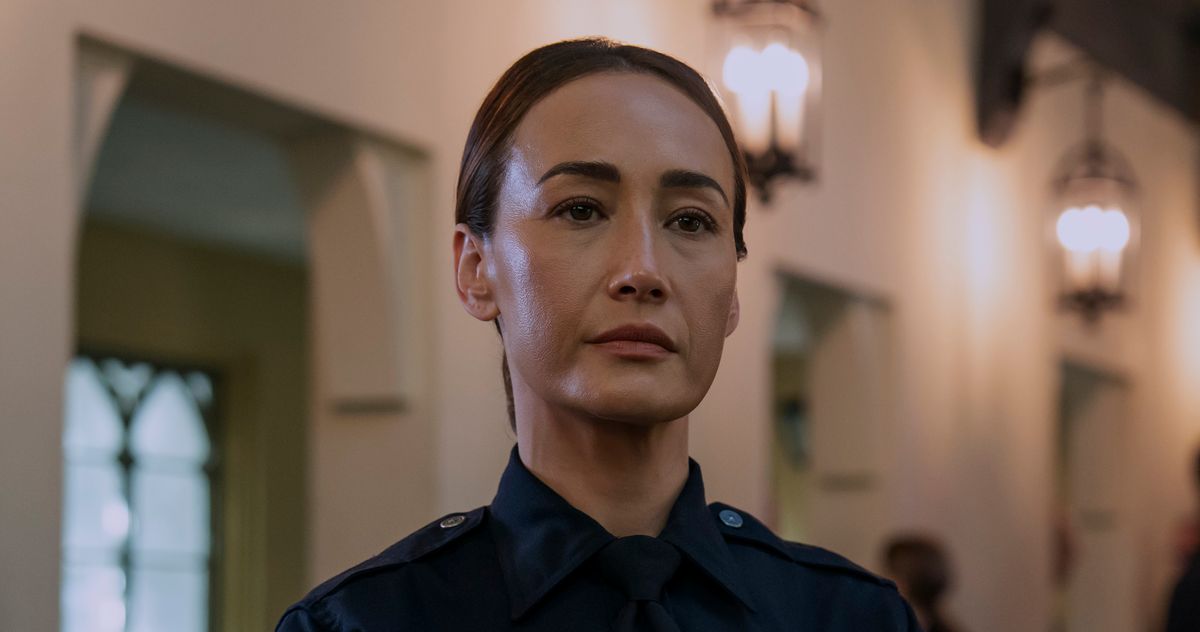
اترك تعليقاً